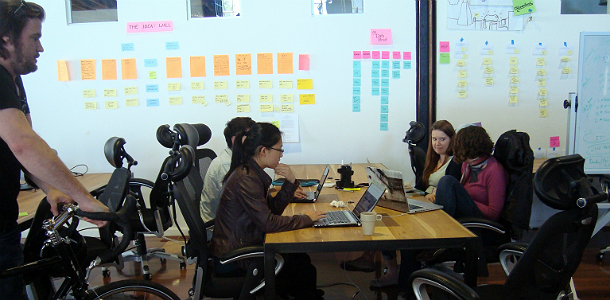
Civic hackathon in San Francisco (Photo Credit: mk30/Flickr)
At the same time that California is home to some of the biggest technology companies in the world, the state is also ripe with opportunity to help bring government here into the 21st century. A new, one-of-a-kind MBA in Civic Innovation at California College of the Arts in San Francisco aims to do just that by combining design, innovation, leadership and technology.
“Delivery of government services is stuck in the horse and buggy era,” said Brian Purchia, a communications and policy strategist who served as a spokesman and tech advisor for former San Francisco Mayor Gavin Newsom. “Meanwhile Twitter, Facebook, Snapchat and Google are all based here in California but many of these folks don’t know of an opportunity to build a company focused on government software. We have the best and brightest all over California and this MBA will provide training for them.”
The idea was born during a brainstorming session last year where Purchia was a participant, who also helped in the development of the program. Now a reality, the two-year program will take students through topics like financial accounting, running a social enterprise, analytics/open data, redesigning government services and coding/app development.
Robb Korinke, a principal at Grassroots Lab and organizer of California Forward’s Summit on Data in Sacramento, said the new program will help meet the challenge of merging government with the technology that can make it more efficient.
“Transforming government will increasingly require innovative young professionals trained in both the workings of government and technology,” said Korinke. “The MBA in Civic Innovation degree is a first-of-its-kind program addressing exactly that. Frankly I wish I could go back and get one myself.”
The burgeoning field presents a huge opportunity for those who will likely want it.
“For folks that are business minded, this is an untapped market,” said Purchia. “The next great idea in terms of this civic technology space probably hasn’t been invented. A lot of them were invented in the last year of two. It’s a very ripe space.”
Recent revelations of months-long waiting lists for those seeking medical treatment from the Veterans Administration and the initial troubled launch of healthcare.gov showed just how far the government is behind current technological times. As Purchia explained, “A lot of these IT companies that the government generally contracts with were created before the internet! We’ve had the same group of players providing the same solutions.
“After healthcare.gov fell apart, the White House pulled together a strike force team of technologists to come fix what wasn’t working. This group became part of the federal government called the U.S. Digital Service which brought in people from outside government to tackle certain projects. The first project was healthcare.gov. The second one is the V.A. and they’re starting to tackle that issue.”
That kind of technology update would be a huge boost to the efficiency of California government. Purchia said the value of the civic tech sector is estimated in the billions of dollars and it’s primed for new leadership to improve services.
“When you want a business permit, it should be an easy online process,” added Purchia. “But, still to this day, a lot of it is paper-based. Instead of waiting in line you should be able to get online.”
Given the growing interest in civic-minded “for-benefit” business ventures, impact investing, and cities looking to improve data-driven decision making through better technology, it’s clear there will be a market for these grads in California’s future.
“The MBA in Civic Innovation isn’t some crazy idea. New York University has a whole school called CUSP [Center for Urban Science and Progress] dedicated to this area. Considering all the companies based in our own state, we should be leading. I don’t want California to get left behind.”

